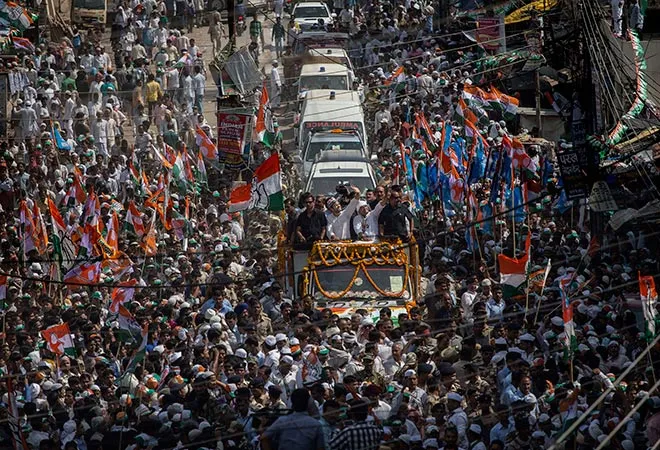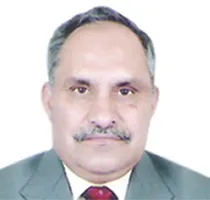-
CENTRES
Progammes & Centres
Location
The existing NOTA option is just symbolic because even if the majority of voters in a constituency detest the candidates, one of them will still be elected.

There is certainly more to life than just politics and elections, not that our media Moghuls would agree, since that they seem to be covering morning, noon and night. Obviously, the forthcoming General Elections are important, every election is, but if truth be told, our party cupboards are bare and the Hobson’s choice that the electorate faces leaves one with feelings of repugnance rather than admiration. That is not cynicism talking but a plain unadulterated statement of fact.
It’s interesting that any discussion on improving the effectiveness of the NOTA option that a voter presently enjoys when faced with unsuitable candidates, is invariably most vehemently opposed by politicians across the board. The last thing they need is for NOTA votes to be taken cognizance of.
Just for a minute suppose, not that it will ever happen, we were to amend our electoral rules and require a re-poll if NOTA votes polled in any constituency were higher than those polled by any candidate there. It would create a nightmarish scenario for political parties and politicians. Heaven forbid, can you imagine what losing to NOTA would do to their outsized egos, apart off course from seeing their enormous expenses, mostly illegal, going up in smoke. The very reason why this measure should be on the to- do list of every citizen!
Whether one likes it or not, the truth is that the average citizen is powerless and his vote counts for naught, once cast. As pointed out the existing NOTA option is just symbolic because even if the majority of voters in a constituency detest the candidates, it matters little like one of them will still be elected. Sure the voter can change governments but after that what? Let us not fool ourselves into believing that once elected the Member of Parliaments’ loyalty is to his constituents and not his party bosses. Given such a bleak prognosis it is indeed difficult to fathom the unbridgeable chasm that the forthcoming elections have created between long-standing friends and colleagues and within families. Forget politicians, from whom little is to be expected, but even the literati are at each other’s throats on social media using the most unbecoming and vituperative language imaginable in support of their candidates or party of choice.
At the end of the day what are the choices here? On one side a larger than life figure, bereft of grace or empathy, but with a gift of the gab nonetheless. On the other side, dynasts and sophisticated dilettantes, surrounded by fawning corrupt courtiers, with little to show by way of ability except for a family name that has lost much of its gloss over the years. Ironically, neither side lacks in arrogance or contempt for the voter as they sell tattered old dreams that not even they believe in. In this fight for survival between two intractable foes, we seem to have ignored a relatively new phenomenon that may put our democratic institutions at risk, if we do not take corrective action, sooner than later.
One may recall a recent outburst by a chief minister of “Modiji ka Sena” in reference to our long-suffering military. While utterly contemptible and disgusting, there may well be a kernel of truth in it. In these past few years, we have had a spate of senior civil servants and military officers joining active politics after superannuating.
Presently, there is no bar on any individual joining politics after leaving government service; to the contrary one may very well hope that their joining improves the level of political discourse. Yet, there remains a niggling doubt as to whether it is prudent to allow senior military commanders such as the service chiefs or Army commanders or even secretaries to the government to join active politics immediately after their retirement. No doubt other democracies like the United States or the United Kingdom have no such restrictions, yet we need to remember that we are still a fledgling democracy where illiteracy and feudal practices are yet to be completely eradicated.
While the impact of those from the administrative services joining politics on their former organizations may well be negligible, the same cannot be said of the uniformed services, especially the military. This is because by the very nature of its structure they not only wield enormous authority and clout while in service but continue to exert considerable influence after retirement. The shift from being the exemplar of what the services represent to becoming a servile political worker does nothing for the image of either the military or the individual, especially in the eyes of the rank and file he led the day before.
Also, there is that fleeting possibility, though it may never happen, that some senior officer may well misuse his authority and carry out actions not necessarily in the national interest but in order to curry the favour of the government or some political party. Not something unheard of in the ranks of our police or the central armed police Forces that have certainly impacted their credibility over the years. If such bias were to be exhibited by the military, it would not only hurt their reputation and the apolitical nature of their functioning but in the long run make us vulnerable to unsavoury influences similar to what prevails in our neighbourhood.
In such circumstances, it would be in the interest of our political establishment, civil society, the civil services and the even the Military to debate the issue at length and put in place measures that would alleviate adding more stress to our already overburdened democratic process. One option could well be that those officers retiring in the apex scale of our civil services and military should only be permitted to participate in active politics, after a “cooling off” period of three to five years as found appropriate.
This commentary originally appeared in The Times of India.
The views expressed above belong to the author(s). ORF research and analyses now available on Telegram! Click here to access our curated content — blogs, longforms and interviews.

Brig. Deepak Sinha (Retd.) was Visiting Fellow at ORF. Brig. Sinha is a second-generation paratrooper. During his service, he held varied command, staff and instructional appointments, ...
Read More +